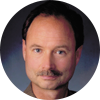- David Herbert Lawrence, "Healing"1
Health care is certainly one place where the scientific and the spiritual collide.
When internal states are not dealt with in a healthy way, they may express in other ways. Some patients "somaticize"2 outer distresses into their bodies. Others "concretize" their lives with inner turmoil. Still others "project" hunger for meaning onto persons or therapies. What is really missing is an anchor, an unassailable center. Without a belief, daily assaults of living can overwhelm us. "Diseases of meaning"3 can be as serious as drug addiction, chronic illness, risky behaviors, and suicide.
In our talk-show era, people have beliefs in everything and anything, including health care. Everyone has a favorite medical horror story. But what about "belief" in medicine or alternative medicine? Are they worthy of belief?
When a physician found a suspicious shadow in her mammogram Sara declared she didn't "believe in medicine," and cancelled her oncology appointment. Three years later, after healers retrieved her soul, restored her spirit, and balanced her chakras, she was fighting for her life with conventional medicine. She spent tens of thousands of dollars because she did not have faith in medicine and was acting according to her stated faith. But what did she have faith in - anything but medicine? Eventually, her "belief" was restored. Could a more enlightened, informed stance three years earlier have benefited her? When did health care become something to believe in or not believe in? Confidence should be measured, but faith is misplaced.
In illness, the innate integrity is overwhelmed. Illness tests our faith as to whether health can be restored. And most of the time - given time - it is. Except, perhaps, for common principles taught in great religions, such as surrender, faith, compassion and forgiveness, we know few balms for the soul. And most of these are self-care.
In integrative health care, physicians offer comfort to reduce the distress of illness, which may become another illness or aggravate the primary illness. The best of science, souls, and spiritual confidence are brought to the healing opportunity.
But just what is science, and what is spiritual? Often, the spiritual may be a science awaiting discovery. Divine interventions are, among other things, unpredictable. They appear in their own time. But what is today's "miracle" can become a fine clinical tool when it reveals itself though scientific discovery.
Can chiropractic management help otitis media, enuresis or asthma? These are interesting questions that must be separated from miracles to be "practiced." If you could practice miracles, they wouldn't be miracles. You cannot practice what you cannot predict or control. If chiropractic demonstrably helps some types of asthma, the treatment loses its halo. But now, more people can be helped. The God in the "box of miracles" can then emerge from the mysterious to become a reliable treatment.
The body's innate drive to heal is the basic preference of life to return to order. Is this God's active intercession? A metaphor? An artifact of language? Or basic biology?
Assigning cause to either Creator or creation is a personal preference. Statistics indicate our days are filled with events unlikely to occur. Earthly life may be unique in the entire universe, due to the narrow temperature range, water, oxygen, protection from radiation, and other factors.4 Even when confronted with extreme improbabilities, there are still explanations that lead us to more predictable and healthier lives. Even so, life is a miracle, by most perspectives.
Science liberates useful tools trapped in secret places or elaborate rituals. It is a tool for discovering other tools; it need not be feared or worshipped. Ultimately, it will not deliver us from mortality or feed our souls' desire to experience the beauty of a painting or symphony. It can never answer the big questions. For that, we need a spiritual life. Many of us still require the mysterious and unexplained to keep us humble. But that does not keep us from asking questions.
Health care needs better outcomes and lower costs. Health care needs to get back to health. I advise consumers to place their faith in something more worthy than health care.
References
- Lawrence DH. Complete Poems, volume 3. London: William Heinemann Ltd., 1957, p. 50.
- Bass C, Bond A, Gill D, Sharpe M. Frequent attenders without organic disease in a gastroenterology clinic. Patient characteristics and health care use. Gen Hosp Psychiatry Jan-Feb 1999;21(1):30-8.
- Davidson S. Cultivating spiritual intelligence to heal diseases of meaning. Contemp Nurse Apr 2002; 12(2):103-5.
- Ward PD and Brownlee D. Rare Earth: Why Complex Life is Uncommon in the Universe. Copernicus Books, 2000.
J. Michael Menke, DC
Tucson, Arizona
Click here for previous articles by J. Michael Menke, MA, DC, PhD.





